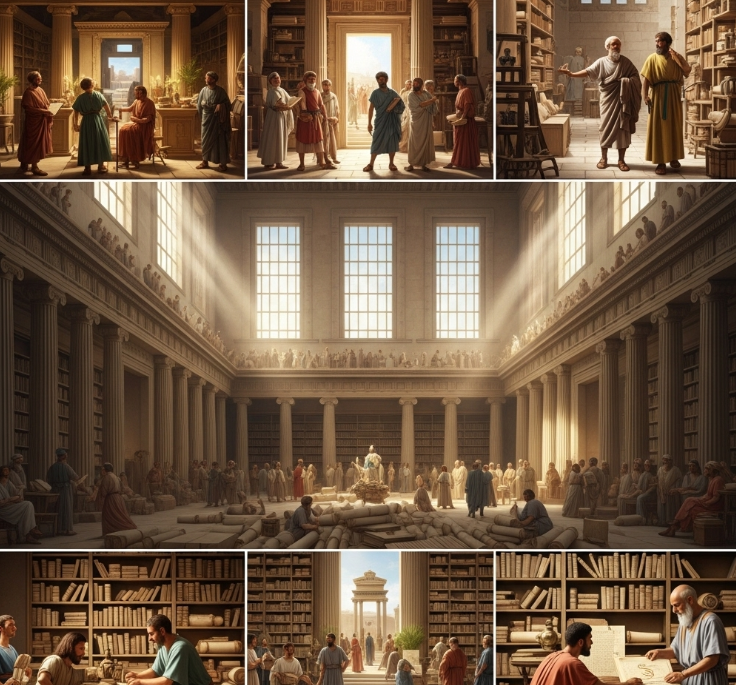How One Library Aspired to Hold the Wisdom of the World
In the heart of ancient Egypt stood one of humanity’s most ambitious intellectual projects: the Library of Alexandria. Conceived not merely as a place to store scrolls, but as a beacon of knowledge and learning, the library became the crown jewel of the ancient world’s scholarly pursuits. Its influence stretched across continents, shaping science, philosophy, and literature for centuries—and its tragic destruction became a symbol of cultural loss that echoes into our time.
A Vision of Universal Knowledge
Founded in the early 3rd century BCE under the reign of Egypt’s Ptolemaic dynasty—most likely during the rule of Ptolemy I Soter or his son Ptolemy II Philadelphus—the Library of Alexandria was not just a repository of texts, but an intellectual powerhouse. The goal? To collect every book in existence, in every known language.
The library was part of the Mouseion, a temple dedicated to the Muses, the Greek goddesses of the arts and sciences. This institution functioned as a research university, attracting some of the greatest minds of antiquity and laying the groundwork for centuries of academic inquiry.
What Was in the Library?
Estimates suggest the Library of Alexandria housed between 400,000 to 700,000 scrolls, though no exact count survives. These texts covered a vast array of topics:
Mathematics and astronomy
Medicine and anatomy
History and geography
Poetry, drama, and philosophy
Religious and cultural texts from Egypt, Mesopotamia, India, and beyond
Because of Alexandria’s status as a major port city, every ship entering the harbor was searched for scrolls, which were copied and added to the collection—sometimes with the originals kept and copies returned.
Brilliant Minds and Major Discoveries
The library attracted scholars from across the known world, offering stipends, lodging, and unparalleled access to information. Some of history’s greatest thinkers walked its halls:
Eratosthenes: Calculated the Earth’s circumference with astonishing accuracy.
Hipparchus: Developed star catalogues and refined astronomical models.
Herophilos: Conducted human dissections and advanced the study of anatomy.
Callimachus: Created the world’s first library catalog system.
Archimedes, Euclid, and others were either associated with Alexandria or influenced by its scholars.
It was here that scientific inquiry, philosophical debate, and literary criticism flourished like never before.
The Tragic Fall: Fires, Politics, and Forgetting
The fate of the Library of Alexandria is shrouded in mystery and multiple waves of destruction—not a single catastrophic event, but a slow unraveling:
48 BCE – Julius Caesar’s siege of Alexandria: In his conflict with Ptolemy XIII, Caesar reportedly set fire to his own ships, and the flames spread to parts of the library or its storage facilities.
3rd century CE – Civil unrest and neglect: Political instability and a decline in patronage weakened the institution.
4th century CE – The rise of Christianity: As Christian power grew, pagan institutions like the Mouseion faced closure. Emperor Theophilus ordered the destruction of pagan temples around 391 CE.
7th century CE – The Arab conquest: Some later sources suggest the final remnants of the library were destroyed during the Muslim conquest of Alexandria, though this account is debated and may be apocryphal.
Rather than one great blaze, the library died by a thousand cuts—neglect, war, changing ideologies, and the erosion of curiosity.
A Symbol of Lost Potential
The destruction of the Library of Alexandria represents more than a historical tragedy. It’s a haunting "what if":
What if Herophilos’s anatomical texts hadn’t been lost?
What if ancient Indian or Mesopotamian manuscripts were preserved?
What philosophical schools or technological inventions were erased from time?
The library’s fall reminds us how fragile knowledge can be, and how crucial it is to preserve it.
Legacy and Modern Inspiration
Though the original library is gone, its spirit endures:
The Bibliotheca Alexandrina, a modern library and cultural center opened in 2002 in Egypt, aims to rekindle the ancient mission.
The concept of open access to knowledge and global scholarly collaboration—so vital in the digital age—finds its roots in Alexandria’s ideals.
Writers, artists, and historians continue to be inspired by the vision of a world united by learning.
Conclusion: A Flame That Still Burns
The Library of Alexandria was more than a building—it was a dream of collective human enlightenment. Though its scrolls have turned to ash, its legend kindles the imagination of all who value learning. In every archive, digital database, or classroom, the echo of Alexandria persists.
We may never recover what was lost, but we can honor its memory by protecting, sharing, and expanding the knowledge we hold today.







